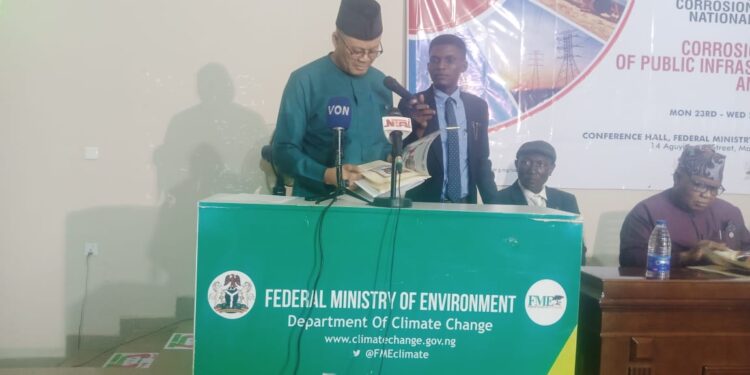The Federal government, through the Ministry of Environment, has declared that corrosion is one of the significant enduring challenges confronting Petroleum Refineries and Chemical Process Industries worldwide.
The ministry is seeking the support of the Nigerian Corrosion Association (NICA) and key stakeholders to drive a shift away from traditional control methods that result in carbon emissions and environmental impact. Instead, they aim to embrace sustainable, cost-effective, and eco-friendly corrosion protection solutions.
Dr. Iziaq Adekunle Salako, the Honourable Minister of State for Environment, made this announcement during the 2023 annual National conference organized by the Nigerian Corrosion Association in Abuja, with the theme “Corrosion Control of Public Infrastructure and Utilities.”
He stated, “Corrosion is also a major ongoing challenge for Petroleum Refineries and Chemical Process Industries globally, some of which have experienced incidents leading to infrastructure damage and loss of personnel. I seek the support of NICA and other critical stakeholders in transitioning from traditional control processes with environmental footprints to sustainable, effective, economical, and eco-friendly corrosion protection technologies.”
“Infrastructure and utilities encompass physical structures, assets, and systems that provide essential services, contributing to a nation’s security, economic growth, environmental sustainability, and citizen well-being, regardless of their characteristics and circumstances,” he added. “Ensuring the integrity, reliability, sustainability, and resilience of critical assets is a top priority for national development.”
Dr. Salako highlighted past incidents such as the Caribbean Petroleum Refining Tank Explosion and Fire in Puerto Rico (2009), the Chevron Refinery incident in Richmond, California (2012), and the tragic Bhopal Pesticide Plant disaster in India in 1984, which claimed nearly 8,000 lives.
“On the national front, Nigeria, as a major oil and gas producer, has made substantial investments in critical infrastructures, from exploration submersibles and oil production platforms to refineries, depots, and transportation pipelines. However, corrosion control remains a particularly challenging issue impacting oil and gas production in three key areas: production, transportation, and refinery operations.”
In his welcome address, the President of the association, Engr. Ese Ochoga, emphasized the inclusivity of this year’s conference theme, focusing on the impact of corrosion on public infrastructure and utilities, a concern shared by all.
He stated, “The period from 2019 to 2023 represents a significant indicator of NICA’s unwavering commitment to driving change through education and enlightenment on best practices in physical asset protection, preservation, and management, which directly affect GDP and industrial, public, and environmental safety.”
“The theme also provides valuable insights and recommendations from materials and corrosion specialists in managing, monitoring, and maintaining our cherished public infrastructures. For many, both technical and non-technical individuals, this will be a paradigm shift, fostering a desire for acquiring rare knowledge.”
Ese Ochoga also mentioned that the conference offers practical solutions available at the exhibition stands and during excursions.











